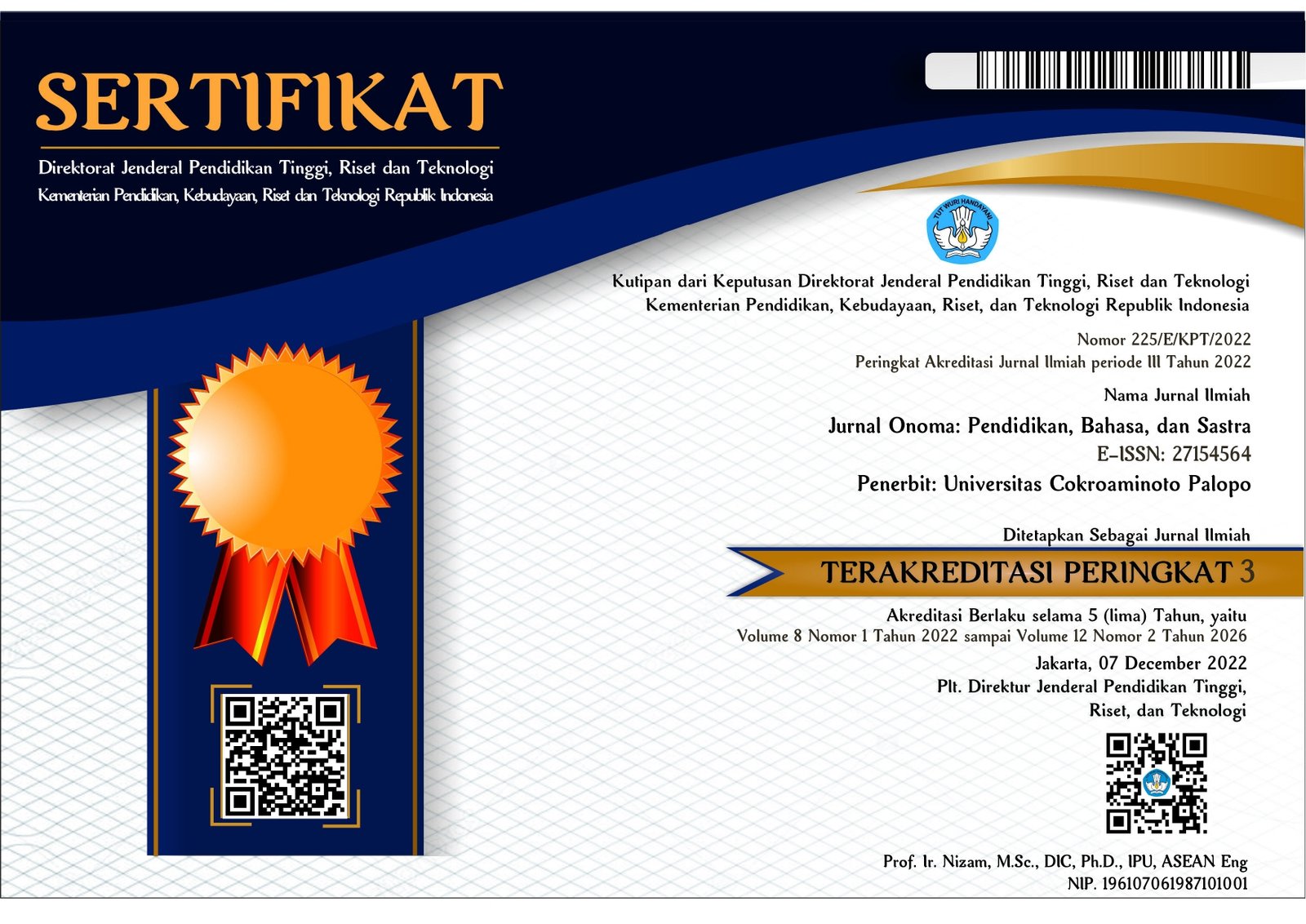Expresive Illocutionary Acts in Disney + Luca Film : A Pragmatic Analysis
https://doi.org/10.30605/onoma.v10i4.3966
Keywords:
Expressive Illocutionary acts, Pragmatic Analysis, Speech ActsAbstract
This pragmatic study investigates the importance of expressive illocutionary acts in character and plot development in the movie Luca from Disney+. By analyzing dialogue from the movie, this study identifies and examines various instances of expressive illocutionary acts, including thanking, praising, complaining, apologizing, and blaming. Using the descriptive-qualitative method, a total of expressive illocutionary acts are identified, which include 5 examples of thanking, 1 example of praising, 1 example of complaining, 1 example of apologizing, and 1 example of blaming. These speech acts were further analyzed for their underlying functions, ranging from competitive purposes to friendly, collaborative, and conflictual purposes. The objective of this research is to explore how expressive illocutionary acts contribute to the emotional depth of the characters and to the resolution of conflicts within the plot. Through this classification, we gain a deeper understanding of how these communicative acts function to reinforce social norms, negotiate conflict, and shape the overall storyline
Downloads
References
Abdul, C., & Leonie, A. (2010). Sosiolinguistik Perkenalan Awal. Jakarta: Rineka Cipta.
Akmal, S., Fitriah, F., & Zafirah, H. (2020). Illocutionary acts in religious discourse: The pragmatics of Nouman Ali Khan’s speeches. Langkawi: Journal of The Association for Arabic and English, 6(2), 130-142. DOI: https://doi.org/10.31332/lkw.v6i2.1938
Astuti, N. D. (2016). Tindak Tutur Ilokusi Ekspresif Pada Film Coraline Karya Neil Gaiman: Kajian Pragmatis (Doctoral dissertation, Universitas Widyatama).
Austin, J. L. (1975). How to do things with words. Harvard university press. DOI: https://doi.org/10.1093/acprof:oso/9780198245537.001.0001
Bogdan, R., & Biklen, S. K. (1997). Qualitative research for education. Boston, MA: Allyn & Bacon.
Chaer, A. Kesantunan Berbahasa. 2010. Kesantunan Berbahasa. Jakarta: Rineka Cipta.
Dwi, N., & Simatupang, E. C. (2024). Positive Politeness Strategies At Google Review Post Caption. Jurnalistrendi: Jurnal Linguistik, Sastra, Dan Pendidikan, 9(1), 56-64. DOI: https://doi.org/10.51673/jurnalistrendi.v9i1.2153
Jihad, S. (2021). English Teachers’ Speech Acts in English as a Foreign Language (EFL) Classroom Videos. PJEIS: Parahikma Journal of Education and Integrated Sciences, 1(2), 83-87.
Leech, G. N. (1983). The principle of pragmatics of. Cambridge University Press.
Leech, G. N. (2016). Principles of pragmatics. Routledge. DOI: https://doi.org/10.4324/9781315835976
Lestari, A. S., & Simatupang, E. C. (2023). Deixis in Taylor Swift’s Speech at New York University Spring Graduation 2022: A Pragmatics Study. Jurnal Sinestesia, 13(1), 664-673.
Maulidia, H. R., Kusumah, C. M., Novita, D., & Sumarni, T. (2023). Expressive Illocutionary Acts Towords Agus Yudhoyono’s News In Jakarta Globe And The Jakarta Pots’s Newspapers. English Journal Literacy Utama, 8(1), 754-764. DOI: https://doi.org/10.33197/ejlutama.v8i1.216
Prasetyo, E. (2015). An Analysis Illocutionary Acts of Jokowi’s Speeches. Unpublished Thesis of Graduate Program in English Language Studies, Sanata Dharma University of Yogyakarta. 126332012_Full. pdf.
Rizkia, T. (2022). Tindak Tutur Ilokusi Direktif Pada Fil M Raya And The Last Dragon: Kajian Pragmatik (Doctoral dissertation, Program Studi S1 Bahasa Inggris, Universitas Widyatama).
Sari, P., Anggiani, M., Faisa, F. A., Firdausy, S., & Nopriyana, F. Illocutionary Acts In Norwegian Wood Novel By Haruki Murakami: A Pragmatics Study. Turkish Journal of Physiotherapy and Rehabilitation, 32, 3.
Searle, J. R. (1969). Speech acts: An essay in the philosophy of language (Vol. 626). Cambridge university press. DOI: https://doi.org/10.1017/CBO9781139173438
Tajiri, Y. (2021). Tindak Tutur Ilokusi Ekspresif Dalam Film Crazy Rich Asians: Kajian Pragmatik (Doctoral dissertation, Program Studi Bahasa Inggris, Universitas Widyatama).
Yule, G. (1996). Pragmatics. Oxford university press.
Yule, G. (2006). Pragmatik (Cetakan 1,). Pustaka Pelajar.
Yule, G. (2022). The study of language. Cambridge university press. DOI: https://doi.org/10.1017/9781009233446
Downloads
Published
How to Cite
License
In submitting the manuscript to the journal, the authors certify that:
- They are authorized by their co-authors to enter into these arrangements.
- The work described has not been formally published before, except in the form of an abstract or as part of a published lecture, review, thesis, or overlay journal.
- That it is not under consideration for publication elsewhere,
- That its publication has been approved by all the author(s) and by the responsible authorities – tacitly or explicitly – of the institutes where the work has been carried out.
- They secure the right to reproduce any material that has already been published or copyrighted elsewhere.
- They agree to the following license and copyright agreement.
License and Copyright Agreement
Authors who publish with Onoma Journal: Education, Languages??, and Literature agree to the following terms:
- Authors retain copyright and grant the journal right of first publication with the work simultaneously licensed under Creative Commons Attribution License (CC BY 4.0) that allows others to share the work with an acknowledgment of the work's authorship and initial publication in this journal.
- Authors are able to enter into separate, additional contractual arrangements for the non-exclusive distribution of the journal's published version of the work (e.g., post it to an institutional repository or publish it in a book), with an acknowledgment of its initial publication in this journal.
- Authors are permitted and encouraged to post their work online (e.g., in institutional repositories or on their website) prior to and during the submission process, as it can lead to productive exchanges, as well as earlier and greater citation of published work.

















